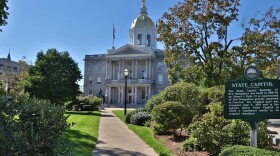The commission studying marijuana legalization in New Hampshire released its 264-page report with 54 recommendations that form a potential blueprint should state legislators pursue bills to legalize cannabis for adult, recreational use.
Though it takes no position on legalization, the commission produced a framework for marijuana legalization, starting with recommending lawmakers refer to it as cannabis.
Recommendations mirror some practices in the eight states that have legalized recreational pot. They include limiting possession to 1 ounce for adults (21+) and up to 5 grams of concentrate, prohibiting public indoor or outdoor consumption, allowing towns and cities an "opt-in" provision, and banning marijuana smoking lounges or in a similar restaurant or business.
Marijuana legalization could generate up to $58 million for the state.

But that is the high end, notes Rep. Patrick Abrami, the commission chairman. The report cites low end range being $15.2 million to $26.9 million, and the high range being $32.7 million to $57.7 million.
It recommends creation of a “pathway” for existing therapeautic cannabis centers, which are now non-profit by law, to become for-profit organizations -- with the intent that they may enter the “adult use” market.
Any proposed home cultivation should limit six plants (three mature) per person, with that limit going to 12 plans (six mature) per household.
The report cites outstanding issues, including that marijuana remains illegal under federal law. Others include:
- Unresolved issues around the lack of roadside testing for impaired drivers.
- Workplace issues, with employees under the influence, in conflict with OSHA and the Drug Free Work Place Act.
- It recommends the creation of a Cannabis Commission to regulate marijuana legalization, similar to the state’s Liquor Commission’s governmental organization. The commission would be charged with licensing and enforcement, with four distinct contracts: cultivation, manufacturing, retail, and testing.
In the event of legalization, the state should fund up to $5 million for public education efforts on safe use and dangers of addiction, according to one recommendation. A proposed marijuana business should be located beyond 1,000 feet of a school.
In the event of legalization, the state should fund up to $5 million for public education efforts on safe use and dangers of addiction, according to one recommendation.
The report recommends any future legislation include language to prevent a “gifting loophole,” where a business could gift an amount of cannabis to skirt regulation or taxation.

And any future legislation “should not restrict internet sales but should reinforce that those sales need to be restricted to customers that are 21 years of age or older living in NH.”
It recommends a wholesale excise tax at the cultivation level--and having the Cannabis Commission or legislators seeking an opinion from the New Hampshire supreme Court on “the constitutionality of taxing a similar product with different ingredients in a different fashion.”
The commission concluded a retail sales tax of 7 percent to 15 percent would be appropriate to generate revenue and meet the cost of regulation, enforcement, public education, and prevention.
If legislators prefer a wholesale excise tax, it suggests a range of $23 to $56 an ounce.
Start-up obligations for legalization, regulation and taxation will cost $2 million to $3 million, according to the commission.
For its tax and revenue estimates, the commission made these assumptions:
(*based on N.Y. state methodolgy)
- Number of N.H. residents (20+) using marijuana: 130,000 (with a "tourism factor" of 1,563)
- Marijuana consumed per person per year: 5- to 7- ounces
- Marijuana consumed yearly: 657,815 to 1,039,348 ounces
- Est. legal market sales: $218.8 million to $385.2 million
The report also features studies in support of and in opposition to several areas of policy, from public health to safety.
(This is story was updated Thursday afternoon.)








